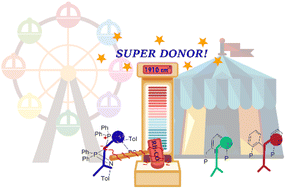Probing the donor strength of yldiide ligands: synthesis, structure and reactivity of rhodium complexes with a PCylideN pincer ligand†
Abstract
Control of the metal ligand interaction by changes in the ligand protonation state is vital to many catalytic transformations based on metal–ligand cooperativity. Herein, we report on the coordination chemistry of a new PCy(H)N pincer ligand with a central ylide as donor site, which through deprotonation to the corresponding yldiide changes from a neutral L3-type ligand to an anionic L2X-type PCYN ligand. The isolation of a series of rhodium complexes showed that the strong donor ability of the neutral ylide PCY(H)N is further increased upon deprotonation, as evidenced by one of the lowest reported CO stretching frequencies in complex [(PCYN)Rh(CO)] (2) compared to other known rhodium carbonyl complexes. DFT calculations revealed that the high donor ability mostly results from the antibonding interaction of the pπ orbital at the ylide with the dxz orbital at rhodium, which enhances the backdonation into the π* orbital of the CO ligand. This unique interaction results in a rather long metal–carbon bond, but still a strong activation of the CO ligand in order to minimize repulsion between the filled orbitals at the rhodium and the ylide ligand. Accordingly, CO by phosphine replacement leads to a strong deviation from the square-planar geometry in the analogous phosphine complexes [(PCYN)Rh(PR3)] and an unusual reactivity with small alkyl halides, which upon oxidative addition add to the CO ligand, before inserting into the P–C bond in the pincer ligand. These results demonstrate the unique donor strength of yldiide ligands and their potential in the activation of strong bonds.



 Please wait while we load your content...
Please wait while we load your content...